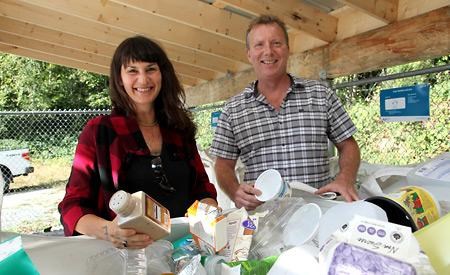It would be a waste if the province’s difficult new recycling legislation causes residents diverting recyclables from the garbage to refuse participation.
While there have been stumbles in implementing the new recycling program in this region, Mike Wall, Powell River Regional District’s manager of community services, said residents embrace the philosophy.
“They are very enthusiastic and passionate about it,” he said. “That is very evident.” He added the Let’s Talk Trash team, comprised of Inger-Lise Burns, Abby McLennan and Tai Uhlmann, have been doing an excellent job of educating local residents and answering questions about what can and cannot be recycled.
“We want to do our very best to divert from our landfill stream,” Wall said. Not only is there a cost associated with Powell River’s landfill materials going all the way to Washington State, but there are also the emissions created from transporting it.
“The more diversion we can create at home through up-cycling and reuse, and recycling, the better for our costs as a region and our greenhouse gas emissions.”
Multi-Material British Columbia (MMBC) coordinates the provincial recycling program. It is an organization made up of businesses that supply the packaging and printed paper to consumers and businesses. The MMBC program came into effect May 19, 2014. Consumers discovered that items they were accustomed to recycling were no longer acceptable.
Three months into the program, Wall and the Let’s Talk Trash team wrote an extensive review outlining the plaudits and problems. The review was presented at a regional board meeting. It resulted in a call from MMBC. The regional district had organized a meeting with Mary Polak, minister of the environment, at the recently concluded Union of BC Municipalities (UBCM) convention and MMBC was interested in what the regional district had to say about the program to the minister.
“We had challenges rolling the MMBC program out and we continue to have a few challenges,” Wall said. “I would like to say that MMBC management has been open, honest and quick to respond and helpful.
“It has been noted that MMBC looks at Powell River Regional District’s efforts and our willingness for open dialogue and exchanging information as very positive, and they see us at the forefront of making this program work, reporting what’s not working for us. Both of us want to move forward and see it improve.”
Wall said determining the eligibility of some products for recycling is cumbersome and difficult. “Our Let’s Talk Trash team has identified so many products, and pushed MMBC to determine whether the product is in or out, and it’s resulted in MMBC having to conduct some research into the legislation.”
He said the Let’s Talk Trash team, the regional recycling depot staff, plus Sunshine Disposal and Augusta Recyclers have faced a steep learning curve in knowing what products are eligible for recycling and which products cannot be accepted.
A challenge at the local level is what to do with the recyclables from the institutional, commercial and industrial (IC&I) sector.
Currently, Green by Nature, the company managing the processing and marketing of recyclables, only processes residential recycling in this regional district area. For IC&I, collection rates would be between $270 and $408 per tonne, depending on depot location. Wall said establishment of a local program would have economic benefit to the community and create jobs here. The regional board has given approval for a request for proposals for a local IC&I program.
The MMBC program, apart from its steep learning curve, is ensuring a much higher proportion of materials is actually recycled rather than landfilled, as was the case previously. Now, less than three per cent of the stream is contaminated, compared to about 40 per cent that made up the contents collected from the old green public recycling bins used prior to the MMBC program. Wall said that everything accepted now has a market and does not enter the waste stream.
In the near future, there will also be initiatives helping local retailers sell products in packaging that is more environmentally friendly. Wall was speaking to a woman recently, who spoke of her frustration with the plastic wrapping around cheese at the supermarket. It is non-recyclable under the current program.
“So, she found a grocery outlet that will cut her cheese off a large block and wrap the cheese with wax-lined brown paper, which will compost,” Wall said. “It’s an example of some of these passionate people that are seeking out alternatives from participating retailers—retailers that get it.”
Wall said it is also best if the consumer takes their own container with them to put the cheese in, along with reusable shopping bags.
“The public is doing its best,” he said. “We would like to look toward the retailers to understand how they can better serve the people purchasing, such as in the example the woman gave me.”
Organics diversion and composting will be the top priority in 2015 and second on the list will be education for retailers.
“Not only will we be educating retailers, but once we do that we are going to also put the positive, good information about retailers that want to engage to the public,” he said. “The public will understand who is on board. It’s hoped this will reflect all the way back up the line to large manufacturers that refuse to package with recyclable materials.”
Colin Palmer, regional district chair, said recycling in BC is becoming complex and that fact was pointed out in the meeting that he, other regional directors, and senior staff had with Polak at UBCM. Palmer said it appears there was receptiveness at the meeting and the deputy minister gave the regional district a gold star for its presentation, which included props devised by the Let’s Talk Trash team to illustrate the intricacies of the program.
“The minister asked the regional district representatives to keep her informed about carrying out the program here and I promised that the regional district would do so,” Palmer said.



